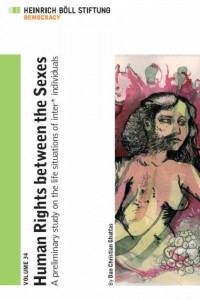Human rights between the sexes, a study
 In November 2013, Dr Dan Christian Ghattas of OII Germany, together with the Heinrich Böll Foundation, published a preliminary study on the human rights of intersex people in 12 countries around the world, including Australia, along with Belgium, France, Germany, New Zealand, Serbia, South Africa, Taiwan, Turkey, Uganda, Ukraine, and Uruguay. While a preliminary study, for methodological reasons, this is the first research that we are aware of that provides a full, comparative analysis of the legal, medical and social status of intersex people. Ghattas says:
In November 2013, Dr Dan Christian Ghattas of OII Germany, together with the Heinrich Böll Foundation, published a preliminary study on the human rights of intersex people in 12 countries around the world, including Australia, along with Belgium, France, Germany, New Zealand, Serbia, South Africa, Taiwan, Turkey, Uganda, Ukraine, and Uruguay. While a preliminary study, for methodological reasons, this is the first research that we are aware of that provides a full, comparative analysis of the legal, medical and social status of intersex people. Ghattas says:
Intersex individuals are considered individuals with a «disorder» in all areas in which Western medicine prevails. They are more or less obviously treated as sick or «abnormal», depending on the respective society.
Dan Ghattas found that:
- Treatments typically involve surgery, to “integrate” intersex bodies “into the social order”. Genital surgery is performed in all countries studied. Gonadal tissue is removed in most countries, before adulthood. Hormone treatments are frequently administered. There is minimal aftercare.
- Birth registrations, with a sex assignment, are required within four weeks of birth in most countries.
- Few countries permit adults to choose non-binary gender identifiers.
- Intersex is considered to be taboo in all countries studied, with intersex people experiencing prejudice, often due to gender non-conforming behaviour and appearance.
- Human rights activism is only recently established, and NGOs are few, small and volunteer-based.
The full report is recommended reading. It is available as a free, downloadable PDF.
Incidentally, the cover image is by artist and OII Germany spokesperson Ins A Kromminga.
You must be logged in to post a comment.